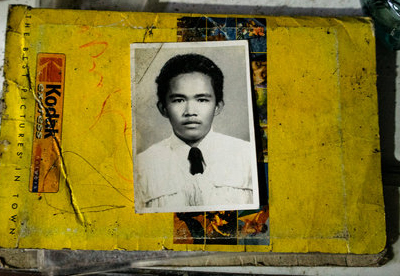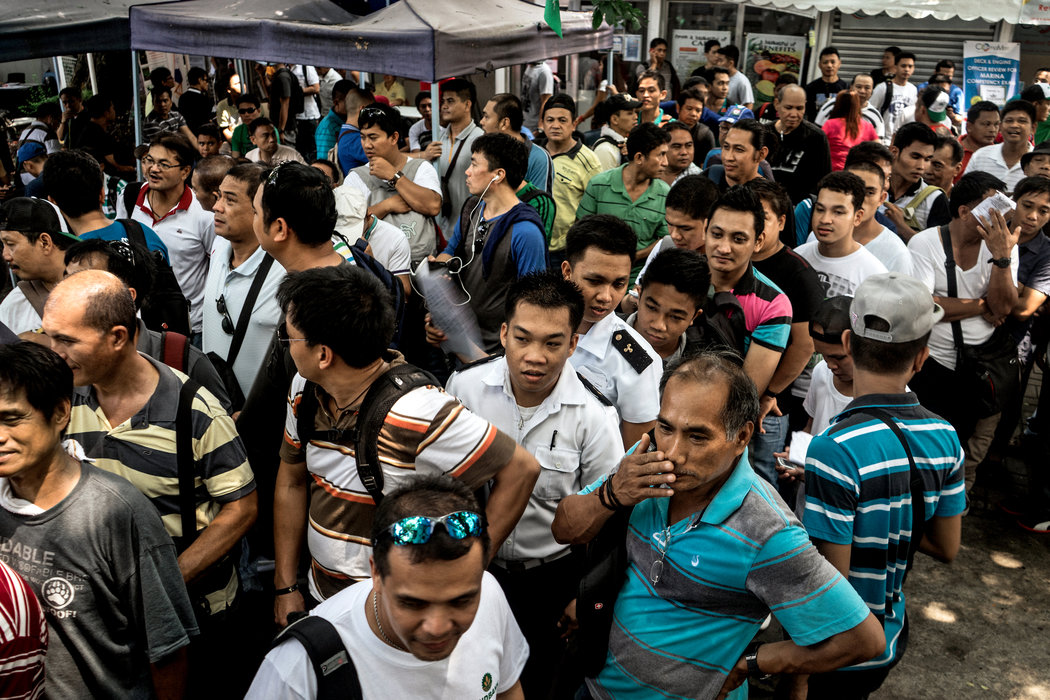
LINABUAN SUR, the Philippines — When Eril Andrade left this small village, he was healthy and hoping to earn enough on a fishing boat on the high seas to replace his mother’s leaky roof.
Seven months later, his body was sent home in a wooden coffin: jet black from having been kept in a fish freezer aboard a ship for more than a month, missing an eye and his pancreas, and covered in cuts and bruises, which an autopsy report later concluded had been inflicted before death.
“Sick and resting,” said a note taped to his body. Handwritten in Chinese by the ship’s captain, it stated only that Mr. Andrade, 31, had fallen ill in his sleep.
Mr. Andrade, who died in February 2011, and nearly a dozen other men in his village had been recruited by an illegal “manning agency,” tricked with false promises of double the actual wages and then sent to an apartment in Singapore, where they were locked up for weeks, according to interviews and affidavits taken by local prosecutors. While they waited to be deployed to Taiwanese tuna ships, several said, a gatekeeper demanded sex from them for assignments at sea.
Once aboard, the men endured 20-hour workdays and brutal beatings, only to return home unpaid and deeply in debt from thousands of dollars in upfront costs, prosecutors say.
Thousands of maritime employment agencies around the world provide a vital service, supplying crew members for ships, from small trawlers to giant container carriers, and handling everything from paychecks to plane tickets. While many companies operate responsibly, over all the industry, which has drawn little attention, is poorly regulated. The few rules on the books do not even apply to fishing ships, where the worst abuses tend to happen, and enforcement is lax.
Illegal agencies operate with even greater impunity, sending men to ships notorious for poor safety and labor records; instructing them to travel on tourist or transit visas, which exempt them from the protections of many labor and anti-trafficking laws; and disavowing them if they are denied pay, injured, killed, abandoned or arrested at sea.
“It’s lies and cheating on land, then beatings and death at sea, then shame and debt when these men get home,” said Shelley Thio, a board member of Transient Workers Count Too, a migrant workers’ advocacy group in Singapore.“And the manning agencies are what make it all possible.”
Step Up Marine Enterprise, the Singapore-based company that recruited Mr. Andrade and the other villagers, has a well-documented record of trouble, according to an examination of court records, police reports and case files in Singapore and the Philippines. In episodes dating back two decades, the company has been tied to trafficking, severe physical abuse, neglect, deceptive recruitment and failure to pay hundreds of seafarers in India, Indonesia, Mauritius, the Philippines and Tanzania.
Still, its owners have largely escaped accountability. Last year, for example, prosecutors opened the biggest trafficking case in Cambodian history, involving more than 1,000 fishermen, but had no jurisdiction to charge Step Up for recruiting them. In 2001, the Supreme Court of the Philippines harshly reprimanded Step Up and a partner company in Manila for systematically duping men, knowingly sending them to abusive employers and cheating them, but Step Up’s owners faced no penalties.
The Philippine authorities have charged 11 people tied to Step Up with trafficking and illegal recruitment of Mr. Andrade and others from the Philippines. But only one person, allegedly a low-level culprit, has been arrested and is likely to be tried: Celia Robelo, 46, who faces a potential life sentence for what prosecutors say was a recruiting effort that earned her at most $20 in commissions.
Mr. Andrade’s story was pieced together from interviews with his family, other seamen recruited in or near his village, police officers, lawyers and aid workers in Jakarta, Manila and Singapore. It highlights the tools — debt, trickery, fear, violence, shame and family ties — used to recruit men, entrap them and leave them at sea, sometimes for years under harsh conditions.
No country exports more seafarers than the Philippines, which provides roughly a quarter of them globally. More than 400,000 Filipinos sought work last year as officers, deckhands, fishermen, cargo handlers and cruise workers. Mr. Andrade’s death shows that governments are sometimes unable or unwilling to protect the rights of citizens far from home.
The abuse of Filipino seamen has increased in recent years, labor officials in the Philippines say, because the country’s maritime trade schools produce, on average, 20,000 graduates a year for fewer than 5,000 openings. As men grow desperate for work, they take greater risks. Roughly a third of them now use agencies that are illegal — unregistered and willing to break rules, the officials said.
Such agencies, favored by ship operators and workers looking to shave costs, compound the problem of lawlessness on the high seas. Scofflaw ships cast off stowaways and deplete fishing stocks. Violence is rampant, and few nations patrol the waters, much less enforce violations of maritime laws or international pacts.
In Manila, in late September, along a densely packed two-block stretch of sidewalk on Kalaw Avenue near the bay, hundreds of seafarers looked for work. Recruiters from manning agencies — some legal, many not — carried signs around their necks listing job openings orpointed to brochures arrayed on tables. Fixers sold fake accreditation papers while a popular Tagalog rap song, “Seaman Lolo Ko” (“My Grandpa Is a Seaman”), boomed in the background.
“These days,” the singer, known as Yongas, rapped, “it’s the seaman getting duped.” Mariners, who used to be the cheaters (on their spouses), he warned, are now the ones cheated (by everyone else).
The Trip
In the summer of 2010, Mr. Andrade was growing restless. He had studied criminology in college in hopes of becoming a police officer, not realizing that there was a minimum height requirement of 5-foot-3. He was two inches shy. His night watchman job at a hospital paid less than 50 cents an hour. When not working in his family’s rice paddy, he spent much of his time watching cartoons on television, according to his brother Julius, 38.
When a cousin told him about possible work at sea, Mr. Andrade saw it as a chance to tour the world while earning enough money to help his family. He was introduced to Ms. Robelo, who prosecutors say was the local Step Up recruiter. She said the pay was $500 per month, in addition to a $50 allowance, his brother and mother recounted to the police.
Mr. Andrade agreed to sign up, handed over about $200 in “processing fees” and left for Manila, 220 miles north of here. He paid $318 more before flying to Singapore in September 2010. He received his plane ticket on his 31st birthday. A company representative met him at the airport and took him to Step Up’s office in Singapore’s crowded Chinatown district.
If Mr. Andrade’s experience was like those of the other Filipino men interviewed by The New York Times, he would have been told then that there had been a mistake: His pay would be less than half of what he had been expecting. And after multiple deductions, the $200 monthly wage would shrink even more.
A half-dozen other men from Mr. Andrade’s village, who prosecutors said were also recruited by Step Up, recalled in interviews that the paperwork flew by in a whirlwind of fast-moving calculations and unfamiliar terms (“passport forfeiture,” “mandatory fees,” “sideline earnings”).
First, they were required to sign a contract, they said, that typically stipulated a three-year binding commitment, no overtime pay, no sick leave, 18- to 20-hour workdays, six-day workweeks and $50 monthly food deductions, and that granted captains full discretion to reassign crew members to other ships. Wages were to be disbursed not monthly to the workers’ families but only after completion of the contract, a practice that is illegal at registered agencies.
Next, some of them signed a bill to pay for food supplies in advance; like most of the deductions, the $250 fee was kept by the agency. Then came the“promissory note,” confirming that the mariner would pay a “desertion penalty,” usually more than $1,800, if he left. The document noted that to collect their wages, crew members would have to fly back to Singapore at their own expense.
Mr. Andrade, like the other deckhands recruited by Step Up, came from a village (Linabuan Sur’s population is roughly 3,000). The men said they had never before traveled abroad, worked on the high seas, heard the term “trafficking” or dealt with a manning agency. None could explain why they might need a copy of any contract they signed as proof of a two-way agreement. They still did not know why it was troubling that a boss in a foreign country should confiscate their passports, which rendered them powerless to leave.

By that point, most of the men were deeply in debt, some more than $2,000, from recruiters’ fees, lodging expenses, health checkups, tourist visas and seamen’s books (mandatory maritime paperwork). They had borrowed from relatives, mortgaged their homes and pawned family possessions: “our one fishing boat,” “my brother’s home” and a carabao (a water buffalo), they said.
Standing on a 35-foot wooden boat late one recent night, about 40 miles from the Philippine shore, Condrad Bonihit, a friend of Mr. Andrade’s, explained why poor villagers gravitated to illegal manning agencies.
“It takes money to make money,” Mr. Bonihit said as he helped hoist a 50-foot net gyrating with anchovies. To get jobs legally requires coursework at an accredited trade school that can cost $4,000 or so, he said, far more than most villagers can afford. And the wages quoted by Step Up are often nearly double what the men might make through an accredited company.
At sea, though, the reality is different from the promises on land, Mr. Bonihit said, adding that he had lasted 10 months in the job he got through Step Up. When the once-a-week beatings of crew members became too much to bear, he left his ship in port. With help from missionaries, he flew home, he said.
“You go with pride,” he said of his experience, “come back with shame.”
Even though Mr. Andrade, Mr. Bonihit and the other Filipino men traveled to Singapore at different times over the past five years, nearly all of them described in virtually identical terms a two-bedroom apartment on the 16th floor, above Step Up’s office, where they waited before and after voyages.
As he headed toward his first job at sea, Mr. Andrade stayed in the apartment for about a week, according to family members who spoke with him briefly by phone. Pots and pans were stacked in the corners, and the walls were greasy from frying fish. The floor was so dirty that moss grew in patches, and with the windows sealed, the rooms reeked of urine and sweat, according to interviews and court records.
A short Filipino man in his 40s, known as Bong, managed the apartment for Step Up with a Chinese woman, Lina, affidavits say. New recruits were told to keep their voices down and to avoid moving around much. Some of the men were required to leave before 7 a.m. and return after dark. Others were confined to the apartment, which Bong kept locked all the time.
At night, 20 or more men lay on flattened cardboard on the floor, inches apart. If Bong pointed at you, three of the seafarers recounted, it meant you were to sleep in his room, where, they said, he demanded sex. “No was not an option,” one of the men said, because Bong controlled who got which jobs.
Mr. Andrade’s relatives say they lost track of him shortly after receiving his final text message. “Bro, this is Eril,” Mr. Andrade wrote on Sept. 15, 2010. “I am now here in Singapore I was not able to text earlier I ran out of phone credit.”






